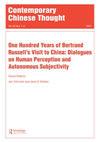The Philosophy of Affairs
IF 0.4
3区 哲学
0 ASIAN STUDIES
引用次数: 2
Abstract
Yang Guorong is a contemporary philosopher with little need for introduction—and not only because he has been introduced here before. Professor Yang’s decades of prolific scholarship cover nearly all major fields of Chinese philosophy, from the pre-Qin Masters to neo-Confucian metaphysics on to modern academic philosophers. That scholarship is accompanied by a series of major works laying out his own original philosophy, comprised principally of his “concrete metaphysics.” Most recently he has expanded on that theorizing by formulating the philosophy of “affairs” introduced in the essays collected here. This introduction outlines and contextualizes their main arguments. So what is a philosophy of affairs? “Affairs” translates the Chinese shi, a most commonplace term. You shenme shi? (What’s up?) You shi ma? (Everything all right?) Zhe shenme shi? (What’s this?) Yet despite its everyday nature, the term itself is strikingly difficult to render into English— and this is in fact a defining feature of the philosophy. Yang argues that “affairs,” shi, offers a view of the world that is distinctively Chinese. It belongs to “Chinese philosophy,” shaping and shaped by a unique metaphysical outlook and, most importantly, giving us a unique philosophical framework for understanding our understanding. While we might identify this with the Chinese nation or tradition or ethnicity or culture, in the most deeply important sense Yang describes the ideas and arguments he puts forward here as Chinese in the sense of being deeply rooted in Chinese language and the particular philosophical systems that grew within and through it. We can thus say it is distinctively Chinese philosophy in both the sense of being a philosophy of China and its culture, zhongguo zhexue, and being a philosophy that operates in ways distinctive to and shaped by Chinese language, hanyu zhexue. In fact, it integrates the two in a way so inseparable that it calls into question the contemporary push to distinguish the two. The philosophy of affairs, that is, is shaped by the unique conceptual schemes of its original language; it was also a force that shaped the language itself. Perhaps the most troublesome thing about translating the term shi here is that its closest English equivalent is the informal, slang use of the word “thing”: wo you shi (I have a thing—in the sense of some engagement); zhe zhong shi (this kind of thing). But a main point of the essays that follow, in laying out the basic framework of the philosophy of affairs, is precisely the distinction between affairs and things, shi and wu. The core argument of the philosophy of affairs is to point out that it is necessarily through affairs that we engage with things in meaningful ways. Affairs must be conceptually事务哲学
杨国荣是一位不需要介绍的当代哲学家,这不仅仅是因为他之前已经在这里被介绍过了。杨教授几十年来的丰富学术研究几乎涵盖了中国哲学的所有主要领域,从先秦大师到新儒家形而上学,再到现代学院派哲学家。这一学术成果伴随着一系列的主要著作,阐述了他自己的原始哲学,主要包括他的“具体形而上学”。最近,他通过在这里收集的文章中介绍的“事务”哲学,扩展了这一理论。这篇引言概述了他们的主要论点,并将其置于背景中。那么什么是事务哲学呢?“事”译为中文“事”,这是一个最常见的术语。你在说什么?(怎么了?)你是老师吗?(一切都好吗?)哲神神师?(这是什么?)然而,尽管这是一个日常用语,但这个术语本身却非常难以译成英语——这实际上是哲学的一个决定性特征。杨认为,“事务”提供了一种具有中国特色的世界观。它属于“中国哲学”,塑造和塑造了一种独特的形而上观,最重要的是,它给了我们一个独特的哲学框架来理解我们的理解。虽然我们可能会把这与中国民族、传统、种族或文化联系起来,但在最重要的意义上,杨将他在这里提出的观点和论点描述为中国人,因为他深深植根于中国语言,以及在中国语言中成长起来的特殊哲学体系。因此,我们可以说,它是一种独特的中国哲学,既是一种中国哲学,也是一种中国文化的哲学,也是一种以独特的方式运作的哲学,并受到中国语言的影响。事实上,它以一种不可分割的方式将两者结合在一起,以至于对当代将两者区分开来的努力提出了质疑。也就是说,事务哲学是由其原始语言的独特概念图式所塑造的;它也是一种塑造语言本身的力量。也许翻译“shi”这个词最麻烦的地方在于,它在英语中最接近的对应词是“thing”的非正式俚语用法:wo you shi(我有一件事——在某种参与的意义上);这种事。但在接下来的文章中,在阐述事务哲学的基本框架时,一个要点恰恰是区分事务与事物、是与物。事务哲学的核心论点是指出我们必须通过事务才能以有意义的方式参与事物。事务必须是概念性的
本文章由计算机程序翻译,如有差异,请以英文原文为准。
求助全文
约1分钟内获得全文
求助全文
来源期刊

CONTEMPORARY CHINESE THOUGHT
Multiple-
CiteScore
0.10
自引率
0.00%
发文量
0
期刊介绍:
This wide ranging journal is essential reading for anyone who wants to understand the diverse themes and influences that shape Chinese thought today. It features translations of the most current and influential Chinese writings on all aspects of philosophical endeavor, from theoretical essays on systems to studies of China"s cultural and religious development, from interpretations of the Chinese classics to exegeses on Marxist thought.
 求助内容:
求助内容: 应助结果提醒方式:
应助结果提醒方式:


